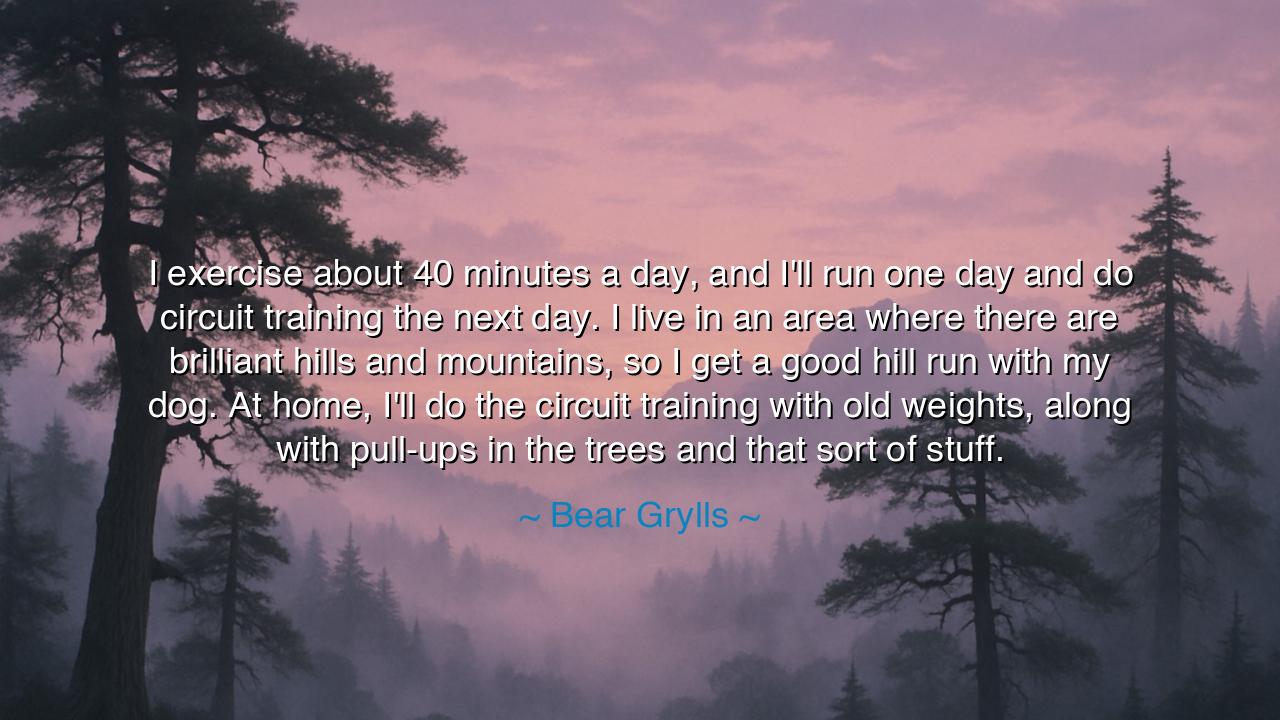
I exercise about 40 minutes a day, and I'll run one day and do
I exercise about 40 minutes a day, and I'll run one day and do circuit training the next day. I live in an area where there are brilliant hills and mountains, so I get a good hill run with my dog. At home, I'll do the circuit training with old weights, along with pull-ups in the trees and that sort of stuff.






In the words of Bear Grylls, “I exercise about 40 minutes a day, and I'll run one day and do circuit training the next day. I live in an area where there are brilliant hills and mountains, so I get a good hill run with my dog. At home, I'll do the circuit training with old weights, along with pull-ups in the trees and that sort of stuff.” — we hear not merely the habits of a man, but the philosophy of one who lives in harmony with both discipline and nature. His words are not about mere fitness, but about the sacred rhythm between body and spirit — a reminder that strength is not born in luxury, but in simplicity and consistency.
Here speaks the voice of one who has tested his body against the wild, and found in that struggle a reflection of the inner world. Grylls, known for his courage and survival, does not boast of elaborate routines or gilded gyms; instead, he speaks of hills, trees, and old weights, of exercises done beneath the sky. This simplicity is the mark of the ancient warrior — the kind who builds endurance not for vanity, but for life itself. His training is not separate from the earth; it is joined to it, as the root is joined to the soil. To run among the mountains, to lift stones and pull upon the branches — these are acts of both strength and humility, for they honor the body as part of creation.
The origin of this reflection lies not in vanity or ambition, but in the pursuit of readiness. Bear Grylls, forged in the crucible of the wild, has faced storms, deserts, and dangers where survival depends not on appearance but on preparation and resolve. His daily discipline is not for applause; it is a covenant with the self. Just as the soldier sharpens his blade even in times of peace, Grylls sharpens his body against the dullness of comfort. For he knows what the ancients knew — that a strong body guards a strong spirit, and that to neglect one is to weaken both.
The ancient Spartans understood this truth well. They trained not in marble halls but upon the harsh earth, wrestling in the dust and running the hills until sweat and pain became their teachers. Their discipline was not cruelty; it was devotion — a daily act of respect for the life they had been given. Bear Grylls walks the same path in our modern age. His pull-ups on the branches are no less noble than the spear drills of Sparta. His “circuit training with old weights” is a song of simplicity — a declaration that one needs little to grow strong, save willpower and purpose.
Yet there is also gentleness hidden in his routine — the mention of his dog, the faithful companion that joins him upon the mountain path. Here we see balance: strength tempered by affection, labor softened by companionship. This, too, is wisdom of the ancients — that life must contain both effort and joy. The man who trains only his body grows hard; the man who remembers love while he labors becomes whole. To run with one’s dog beneath the open sky is to feel again the wild freedom that humankind was born from — and to remember that strength is not to dominate, but to live deeply and gratefully.
The meaning of Grylls’s words reaches beyond exercise. They are a reminder that greatness is found not in grand gestures but in daily habits. Forty minutes a day — that is his temple of discipline. In that small space of time, the ordinary man becomes extraordinary. For the ancients taught that constancy is the mother of virtue. The mountain is not conquered in a single stride, but in the steady rhythm of countless steps. So it is with the body, the mind, and the soul: we are shaped not by what we do once, but by what we do always.
Let us then take from this a lesson for our own lives. Do not wait for the perfect place or the perfect tools to begin your work. Use what you have — the hills near your home, the weight of your own body, the branches that reach toward heaven. Train not for pride, but for life — that you may be ready to face the storms that come, and to protect those you love. Be steadfast, as the mountain is steadfast; be humble, as the earth beneath your feet is humble.
And so, my children, remember this teaching: discipline is freedom. The man who rules his body rules his destiny. Seek strength not in comfort, but in simplicity. Sweat under the open sky, and find there the truth that every dawn brings — that life itself is a daily act of training, and those who embrace it with courage and gratitude shall stand firm when the winds of trial come.






AAdministratorAdministrator
Welcome, honored guests. Please leave a comment, we will respond soon